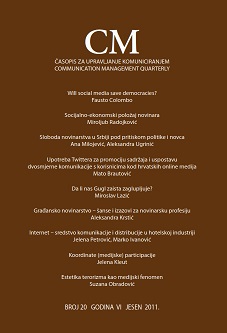Will Social Media Save Democracies?
Will Social Media Save Democracies?
Author(s): Fausto ColomboSubject(s): Media studies, Social Informatics, Sociology of Politics
Published by: Fakultet političkih nauka Univerziteta u Beogradu
Keywords: social media; democracy; participation;
Summary/Abstract: Tools such as Facebook, YouTube or the blogosphere have had a crucial role in enabling circulation of ideas and organization of protests which have led to historical changes that are yet to be over. Protests in Arab world have not only revived the debate on the role of social media in democracies, but also seem to direct it in new ways. With regards to the real political dimension, we should not overlook some very real risks of social networks that accompany their functioning. Polarization, ‘infiltrability’, fragility: these are three serious risks for social media as political tools. Does it still have a sense, then, to interpret them as a positive factor in democracies or democratic processes? The factors of innovation that social media brought in the public action and debate are the following: reducing the “bottleneck” role played by traditional media, organization of real political action and propensity of social media to construct identities. On the basis of discussion about these roles, the fundamental thesis of the model introduced in this paper is the following: social subjects experience political participation in a given context, which can stimulate or repress their attitude towards citizenship. This context can be then split into three main factors, each of which can promote or inhibit the role of citizens: the institutional system, the state of cultural flows and the media system.
Journal: CM Komunikacija i mediji
- Issue Year: 6/2011
- Issue No: 20
- Page Range: 5-20
- Page Count: 16
- Language: English

